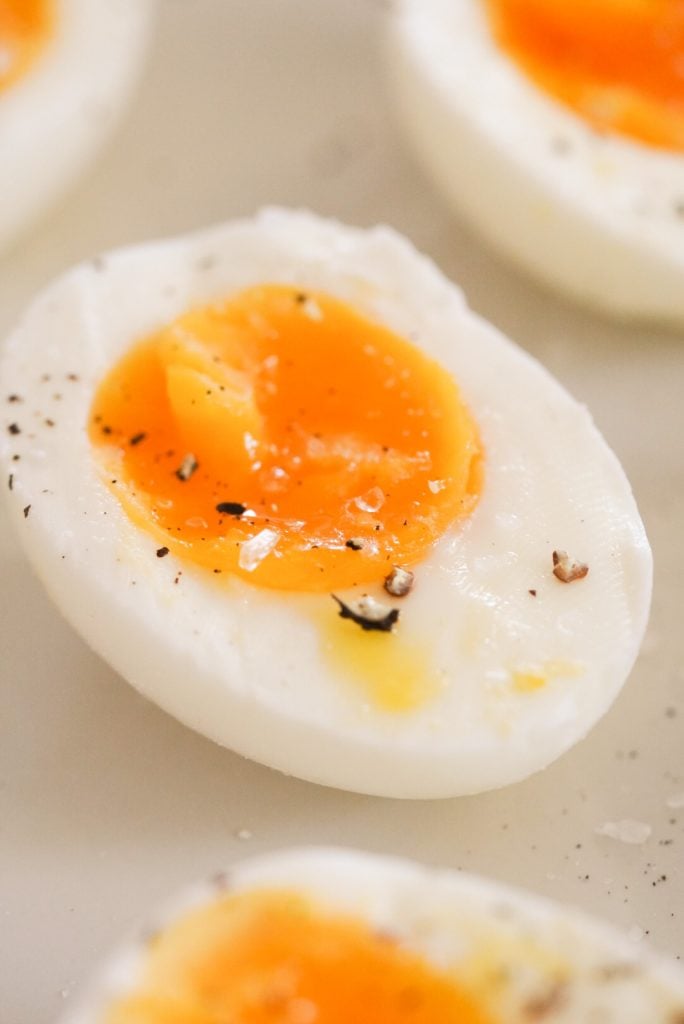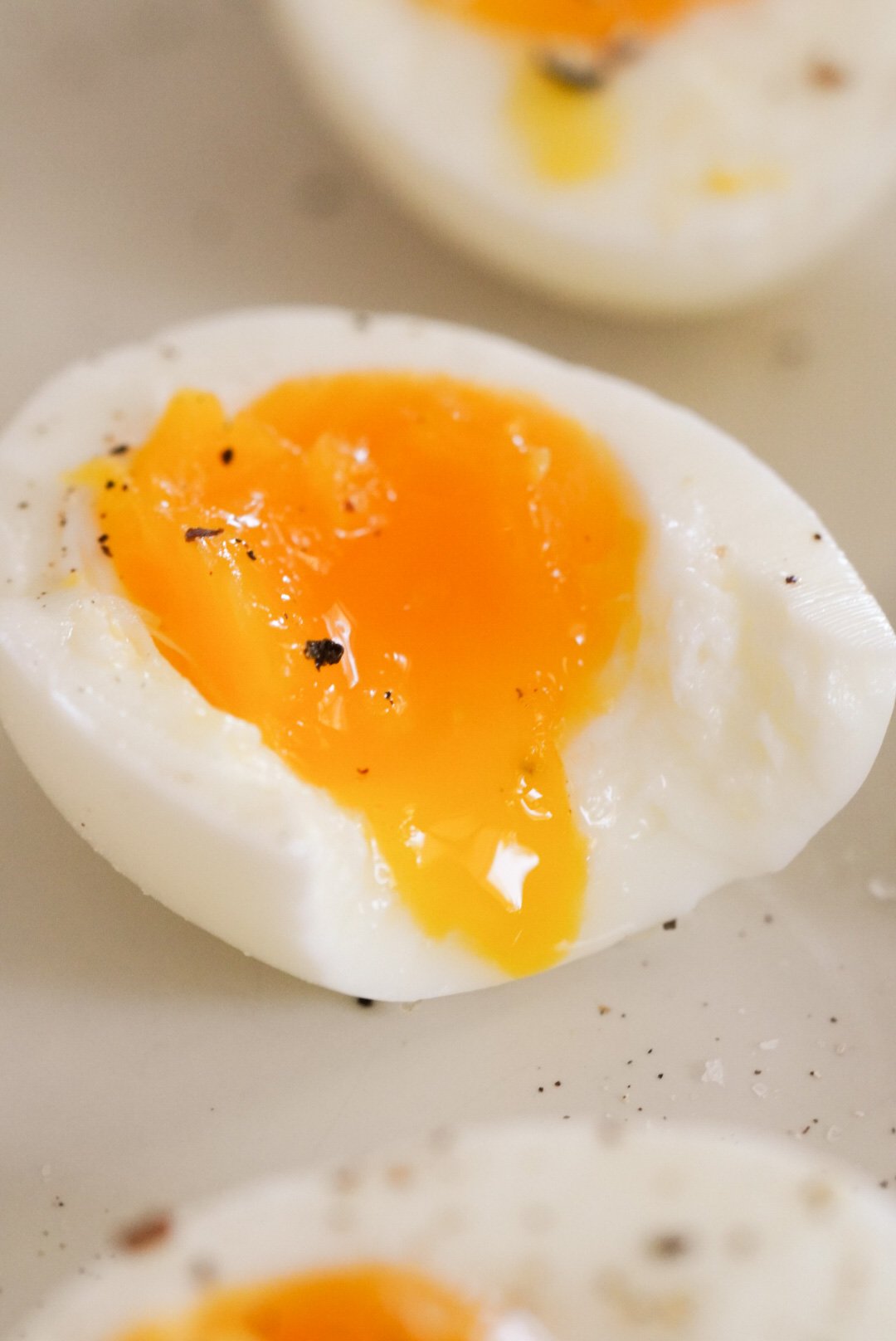Soft-boiled eggs last up to two days in the fridge. Store them in an airtight container for best results.

Soft-boiled eggs are a delicious and nutritious addition to any meal. Their creamy yolks and tender whites make them a favorite for breakfast or a quick snack. Proper storage is essential to maintain their freshness and safety. Please keep them in an airtight container to prevent moisture and bacteria from spoiling them.
Label the container with the date to track its freshness. Discard any eggs that have an off smell or appearance. Following these storage tips, you can enjoy soft-boiled eggs without worrying about their safety.

Credit: wellnessbykay.com
Shelf Life of Boiled Eggs
Soft-boiled eggs are a delicious and nutritious option for any meal. But how long do they last in the fridge? Proper storage is critical to ensuring their freshness. Let’s explore the factors that affect their shelf life.
Factors Affecting Freshness
Several factors influence the freshness of soft-boiled eggs:
- Temperature: Eggs should be stored at a consistent, cold temperature.
- Storage Container: Airtight containers keep eggs fresher for longer.
- Handling: Handle eggs with clean hands to avoid contamination.
Signs Of Spoilage
Knowing the signs of spoilage can help you avoid eating rotten eggs:
- Smell: A foul odor indicates spoiled eggs.
- Appearance: Look for any discoloration or mold.
- Texture: Slimy or chalky textures are signs of spoilage.
Storage Tips:
- Store soft-boiled eggs in a fridge at 40°F (4°C).
- Place eggs in an airtight container.
- Consume within two days for best quality.
Ideal Storage Conditions
Wondering how long soft-boiled eggs last in the fridge? Proper storage is critical. Learn the ideal storage conditions to keep your eggs fresh and safe.
Temperature Requirements
Soft-boiled eggs need to be stored at a cool temperature. The ideal temperature is between 33°F and 40°F (0.5°C and four °C). Keeping the eggs cold helps prevent bacterial growth. Always use a refrigerator thermometer to monitor the temperature.
Humidity Control
Humidity also plays a role in egg storage. The fridge should have a humidity level of around 70-80%. This helps maintain the eggs” moisture and prevents them from drying out. You can use a hygrometer to check the humidity levels.
| Storage Element | Ideal Condition |
|---|---|
| Temperature | 33°F to 40°F (0.5°C to 4°C) |
| Humidity | 70-80% |
Following these guidelines ensures your soft-boiled eggs stay fresh longer. Keep your fridge organized and avoid frequent door openings to maintain these conditions.
Proper Refrigeration Techniques
Proper refrigeration is crucial for keeping soft-boiled eggs fresh. By following these tips, you can extend their shelf life. Below, we explore the best methods to store them effectively.
Best Containers To Use
Choose containers that seal tightly. This keeps out moisture and odors.
| Container Type | Benefits |
|---|---|
| Airtight Plastic Containers | Keep eggs fresh and prevent contamination. |
| Glass Jars with Lids | Non-reactive and easy to clean. |
| Silicone Bags | Reusable and space-saving. |
Labeling And Dating
Always label your containers. This helps you track the freshness of your soft-boiled eggs.
- Write the date when you stored the eggs.
- Use a waterproof marker for clear labeling.
- Include a best-by date to avoid confusion.
By following these tips, you can ensure your soft-boiled eggs remain safe and delicious in the fridge.

Credit: wellnessbykay.com
Extending Freshness
Keeping soft-boiled eggs fresh in the fridge can be tricky. Learning the proper storage techniques is critical. By using specific methods, you can extend their shelf life. Below, we discuss two practical ways: vacuum sealing and using preservatives.
Vacuum Sealing
Vacuum sealing helps maintain the freshness of soft-boiled eggs. This method removes air, preventing bacterial growth. Here is how to vacuum seal your eggs:
- Place your soft-boiled eggs in a vacuum-sealable bag.
- Use a vacuum sealer to remove all the air from the bag.
- Seal the bag tightly to ensure no air can enter.
Vacuum-sealed eggs can last up to one week in the fridge. This method is practical and easy to do at home.
Use Of Preservatives
Using natural preservatives can also extend the freshness of your eggs. Somstandardon options include:
- Vinegar – Add a teaspoon to the water when boiling eggs.
- Salt – Sprinkle a pinch of salt in the water.
- Olive oil – Coat the eggshells lightly after boiling.
These preservatives create a hostile environment for bacteria. As a result, your soft-boiled eggs stay fresh longer. Here’s a quick comparison table for easy reference:
| Preservative | How to Use | Benefits |
|---|---|---|
| Vinegar | Add to boiling water | Inhibits bacterial growth |
| Salt | Sprinkle in boiling water | Prevents spoilage |
| Olive Oil | Coat eggshells after boiling | Seals out air |
Both vacuum sealing and using preservatives are effective. You can choose the method that suits you best.
Safety Concerns
Storinsoft-boiled eggs in the fridge raise safety concerns. Understanding these concerns can help prevent foodborne illnesses. Proper handling and storage are essential for safety.
Risk Of Bacterial GrowtSoft-boiled
Soft-boiled eggs are at risk of bacterial growth. Bacteria like Salmonella thrive in improperly stored eggs. Soft-boiled eggs have a partly cooked yolk, which can harbor bacteria. If left at room temperature, bacteria multiply quickly. Bacteria growth can lead to stomach upset or more severe health issues.
Safe Consumption Practices
To ensure safe consumption, follow these practices:
- Store eggs in the fridge immediately after boiling.
- Keep the fridge temperature at 40°F (4°C) or below.
- Consume soft-boiled eggs within two days for maximum freshness.
- Reheat eggs to an internal temperature of 165°F (74°C) before eating.
Always check for signs of spoilage before consuming. Discard eggs with an unusual smell or appearance.
:max_bytes(150000):strip_icc()/soft-boiled-eggs-for-ramen-Hero-bf6857e86b0b4b5eab36f7f573d7ce8c.jpg)
Credit: www.seriouseats.com
Cooking And Reheating Tips
Soft-boiled eggs are a delicious treat. They are quick and easy to make. But what if you have leftovers? Knowing how to cook and reheat them correctly is essential. This ensures they stay tasty and safe to eat.
Best Reheating Methods
Reheating soft-boiled eggs can be tricky. You want to avoid overcooking them. Here are some of the best methods:
- Stovetop: Place the eggs in hot water for 2 minutes.
- Microwave: Use medium power for 10-15 seconds.
- Oven: Preheat to 300°F and heat for 3-4 minutes.
Maintaining Texture And Flavor
Keeping the texture and flavor of soft-boiled eggs is crucial. Here are some tips:
- Use gentle heat: Avoid high temperatures. It can make the eggs rubbery.
- Short reheating time: Heat only until warm. Overheating can spoil the taste.
- Cover while reheating: Use a lid or cover. This keeps moisture in and prevents dryness.
| Method | Time | Temperature |
|---|---|---|
| Stovetop | 2 minutes | Hot water |
| Microwave | 10-15 seconds | Medium power |
| Oven | 3-4 minutes | 300°F |
Following these tips, you can enjoy soft-boiled eggs even after storing them in the fridge. Remember to reheat them properly to maintain their delicious taste.
Common Mistakes To Avoid
Storing soft-boiled eggs the wrong way can spoil them quickly. Here are common mistakes to avoid when keeping your eggs fresh and safe to eat.
Improper Storage
One common mistake is improper storage. Always store soft-boiled eggs in the fridge. Use an airtight container to keep them fresh. Please do not leave them at room temperature. This can lead to bacterial growth.
| Storage Method | Shelf Life |
|---|---|
| Room Temperature | Less than 2 hours |
| Refrigerated in Airtight Container | Up to 2 days |
Ignoring Expiry Signs
Another mistake is ignoring expiry signs. Check your eggs for freshness. If they smell bad, don’t eat them, and look for changes in color and texture. Fresh eggs should have a clear, firm white and tall yolk. If the yolk is runny, the egg may not be safe.
- Check for the unpleasant smell.
- Look for color changes.
- Observe theyolk’ss texture
You can enjoy fresh and safe soft-boiled eggs by avoiding these mistakes. Proper storage and attention to expiry signs are essential.
Frequently Asked Questions
How Long Can Soft-boiled Eggs Last in the Fridge?
Soft-boiled eggs can last in the fridge for up to two days. Store them in an airtight container.
How to Tell if a Soft-Boiled Egg is Bad?
Check for a foul smell, unusual color, or slimy texture. These signs indicate a rotten, soft-boiled egg.
Can You Eat 2 Week Old Hard-boiled Eggs?
No, it’s not safe to eat 2-week-old hard-boiled eggs. Consume them within one week for best quality and safety.
How Do You Store and Reheat Soft-boiled Eggs?
Store soft-boiled eggs in an airtight container in the refrigerator. Reheat by placing them in hot water for 1-2 minutes.
Conclusion
Understanding how to store soft-boiled eggs ensures they stay fresh and safe. Please keep them in the fridge for up to two days. Always use airtight containers to maintain quality. Check for signs of spoilage before consuming. Proper storage helps you enjoy delicious soft-boiled eggs without worry.


GIPHY App Key not set. Please check settings